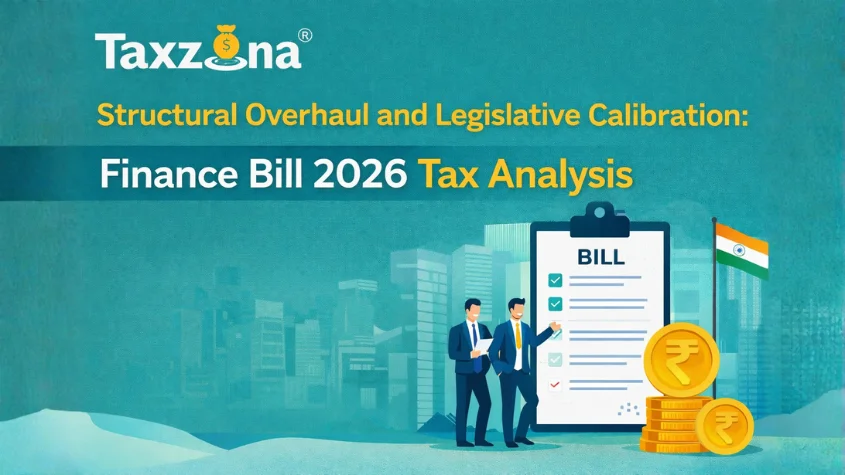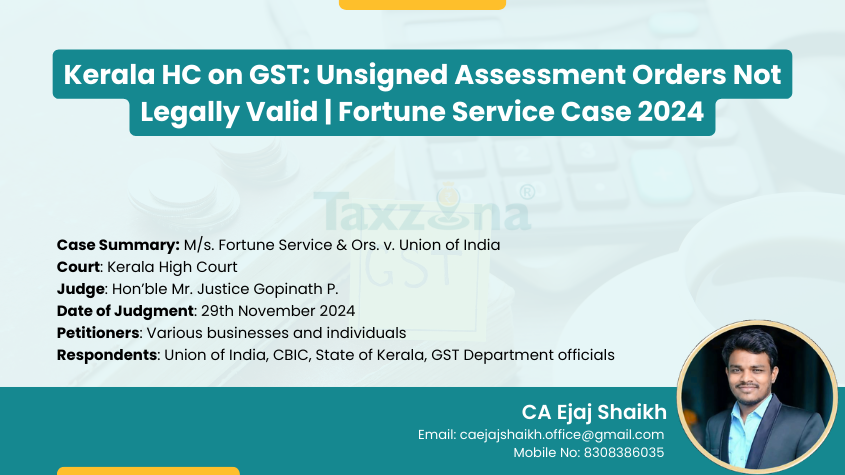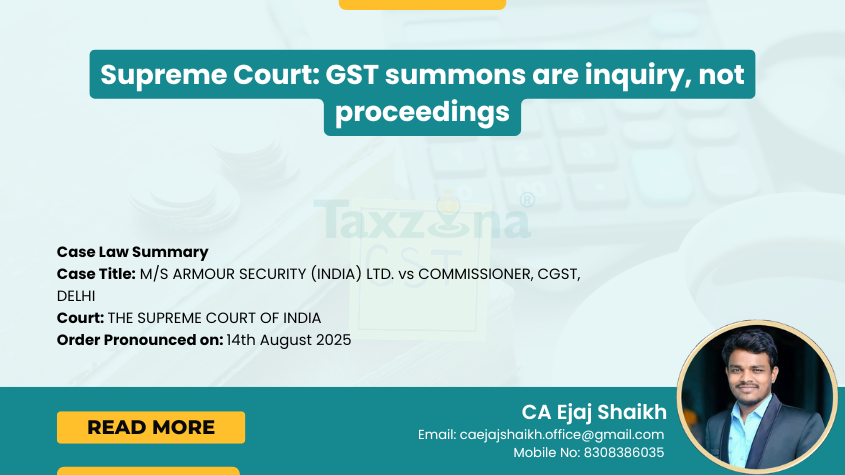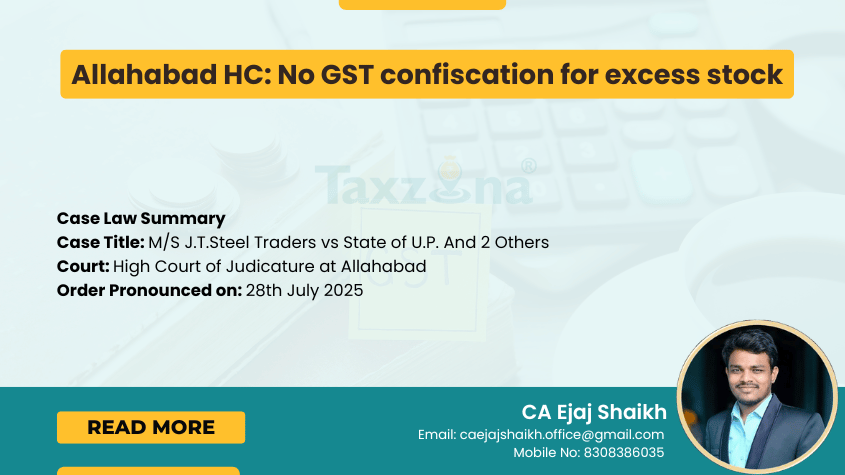
Kerala HC on GST: Unsigned Assessment Orders Not Legally Valid | Fortune Service Case 2024

1. Issue Involved
The primary issue before the court was:
Whether an order issued under Section 73 of the CGST/SGST Acts must bear the digital or manual signature of the issuing officer to be considered legally valid and enforceable.
The petitioners contended that the assessment orders issued against them were unsigned, making them invalid under the law. The tax authorities defended their actions, stating that the orders were uploaded on the GST portal, which they claimed was sufficient for legal validity.
Facts of the Case
- The petitioners, comprising various businesses, were served demand notices and assessment orders under Section 73 of the CGST/SGST Acts.
- The petitioners challenged these orders on the ground that they lacked either a manual or digital signature, rendering them unenforceable.
- The tax authorities argued that the orders were available on the GST portal and, therefore, legally valid.
- The petitioners filed writ petitions before the Kerala High Court, seeking to quash the unsigned orders and prevent recovery proceedings.


3. Observations of the Court
After reviewing the case, the Kerala High Court made the following key observations:
- Unsigned Orders Are Invalid
- A tax order without a manual or digital signature is legally unenforceable.
- Section 160 of the CGST Act, 2017, which deals with mistakes or defects, does not apply to unsigned orders, as the lack of a signature is a fundamental flaw, not a minor procedural error.
- Mere Uploading on the GST Portal Does Not Validate an Order
- Section 169 of the CGST Act, 2017, which allows electronic service of orders, does not override the requirement for a proper signature.
- Uploading an unsigned order on the GST portal does not make it legally valid or enforceable.
- Reliance on High Court Precedents
- The court cited several High Court rulings, including those from Andhra Pradesh, Telangana, Delhi, and Bombay, which had consistently held that unsigned tax orders were invalid.
- Specifically, the Andhra Pradesh High Court in SRK Enterprises v. Asst. Commissioner (ST) (2023) and A.V. Bhanoji Row v. Asst. Commissioner (ST) (2023) ruled that unsigned orders could not be enforced.
- Fresh Orders Must Be Issued with Proper Signatures
- The tax authorities were allowed to issue fresh orders, but they must bear a manual or digital signature to be legally valid.
- If a new officer had replaced the original one, a fresh hearing must be granted to the petitioner before issuing a new order.
- Fresh Orders Will Relate Back to the Original Date
- To prevent limitation period disputes, the court ruled that the fresh orders will relate back to the date of the original (quashed) orders.
- Other Legal Contentions Remain Open
- The court ruled only on the issue of unsigned orders and did not address other potential disputes.
- If the petitioners have additional grievances, they can challenge the fresh orders on separate legal grounds.
4. Judgment of the Court
Based on the above observations, the Kerala High Court ruled as follows:
- The unsigned assessment orders were quashed for being invalid.
- The tax authorities were permitted to issue fresh orders, but they must be properly signed.
- A fresh hearing must be given before issuing any new order if a new officer has replaced the original one.
- The fresh orders will not be time-barred and will be deemed to relate back to the date of the original orders.
- The petitioners can still challenge the new orders on other legal grounds.
5. Case References Cited by the Court
The Kerala High Court relied on the following judgments:
1. Silver Oak Villas LLP v. Assistant Commissioner (ST), Begumpet Division Hyderabad [(2024) 17 Centax 442 (Telangana)] Telangana High Court ruled that unsigned tax orders are invalid under the CGST Act.
2. SRK Enterprises v. Assistant Commissioner (ST) [(2023) 157 Taxmann.com 93] Andhra Pradesh High Court held that Section 160 does not apply to unsigned orders, as the omission of a signature is a fundamental defect.
3. A. V. Bhanoji Row v. Assistant Commissioner (ST) [W.P. No. 2830 of 2023] Court ruled that unsigned orders are not valid in the eyes of the law.
4. Railsys Engineers Pvt. Ltd. v. The Additional Commissioner of CGST (Appeals-II) [W.P.(C) 4712/2022] Delhi High Court declared unsigned orders unenforceable.
5. Ramani Suchit Malushte v. Union of India [W.P.(C) 9331/2022] Bombay High Court reaffirmed that assessment orders require proper authentication to be valid.
6. Key Learnings from the Judgment
- Unsigned orders are unenforceable – If a tax order lacks a proper signature, it can be challenged in court.
- Availability on the GST portal does not ensure validity – Orders must be authenticated with a signature to be legally binding.
- Legal remedies are available – Taxpayers can seek relief from courts if they receive unsigned orders.
7. Conclusion
The Kerala High Court’s ruling strengthens taxpayer rights and reinforces procedural safeguards in GST assessments. By holding that unsigned tax orders are invalid, the judgment ensures that tax authorities comply with the law and maintain transparency in assessment proceedings.
This decision sets an important precedent for future cases and clarifies that all tax orders must be properly authenticated before enforcement.
Recent Post



Have Any Question?
Our experts at Taxzona are here to help you with GST, Income Tax, and all your financial queries. Get reliable guidance tailored to your business and personal needs.

